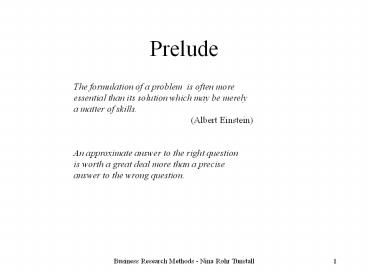Prelude - PowerPoint PPT Presentation
1 / 19
Title:
Prelude
Description:
Business Research Methods - Nina R hr Tunstall. 1. Prelude. The formulation of a problem is often more. essential than its solution which may be merely ... – PowerPoint PPT presentation
Number of Views:181
Avg rating:3.0/5.0
Title: Prelude
1
Prelude
The formulation of a problem is often
more essential than its solution which may be
merely a matter of skills.
(Albert
Einstein) An approximate answer to the right
question is worth a great deal more than a
precise answer to the wrong question.
2
Stages in problem identification
1. The latent stage (ambiguity) - the problem
may not be recognized - the nature of the
problem is unclear - the objectives are vague -
little or no information is available 2. The
categorizing stage (uncertainty) - the general
nature is grasped - the problem can be
sketched - incomplete information 3. The
diagnostic stage (certainty) - the nature of the
problem is recognized - the problem can be fully
defined and structured - all (or nearly all)
required information is available
3
Exploratory studies
- related to the latent stage - a primary
purpose is to diminish ambiguity - i.e., to
create better understanding of the problem - to
get an idea of potential objectives - precedes
descriptive and causal research In general, the
result of an exploratory study will not point to
a direct course of action
4
Descriptive research
- knowledge and understanding of the problems
nature exists - description of
characteristics - answer who, what, when, where
and how - accuracy is required - diagnostic
analysis - precedes causal research
5
Causal research
- the nature of the problem is generally
well-known - identification of cause-effect
relationships - cause effects - assumption about
the direction of causality - almost impossible to
prove - but indications is possible
(probability) - often in policy analyses
6
Example
In old Russia a cholera epidemic once broke
out. Naturally most doctors worked in the areas
where most people were infected. But there were
too few doctors in the country, so the epidemic
could not be controlled. The Czar decided to do
something about the situation. He sent out a
commission who should report back to him. The
commission reported that the more doctors in a
region the more sick people. So the Czar
concluded, that if the country should be saved,
the doctors most be killed.
7
Situation vs. type
No clear idea of problem Exploratory (ambiguity)
research Some ideas of problem Descriptive (u
ncertainty) research Clearly defined
problem Causal (certainty) research
8
Types of Research
- Technique
- Experiments
- Surveys
- Observational studies
- Purpose
- Exploratory studies
- Descriptive research
- Causal research
9
The research process I
- systematic inquiry - careful planning -
interrelated activities/stages
10
The research process II
Formulating conclusions and preparing the report
Defining the problem
Processing and analyzing the data
Defining the new problem
and so on
Planning a research design
Gathering the data
Planning a sample
11
Research process III
Problem discovery
Selection of exploratory research technique
Secondary (historical) data
Pilot study
Experience survey
Case study
Problem definition (statement of research
objectives)
12
Research process IV
Problem definition (statement of research
objectives)
Selection of basic research method
Survey Interview Questionnaire
Experiment Laboratory Field
Observation study
Secondary data study
13
Research process V
Selection of sample design
Probability
Nonprobability
Collection of data (fieldwork)
Editing and coding data
Data processing
Interpretation of findings
Report
14
Problem Definition
A proper definition may - indicate a direction
of search - state clear and unambiguous
objectives - result in efficient information
15
Elements in formulating a problem
- Motivation (why is the problem of interest?) -
Recipient (who is the problem to be solved
for?) - Action (how is the problem to be
solved?) - Purpose (what do we expect to
achieve?)
16
Exploratory research
- Secondary (historical) data - Pilot studies -
Experience surveys - Case studies
17
Research design - often, but not always
Descriptive Research
- Surveys (interviews, questionnaires) -
Experiments (laboratory, field) -
Observations - Secondary (historical) data study
18
Sample design Data collection
- Data collection
- probability
- nonprobability
- Depending on
- research design
- sample design
- pretesting may be applied
19
Data Analysis Results
Data analysis depending on - requirement - the
collected data - the research design -
capabilities (skills and equipment)
Conclusion Results - Interpretations -
Presentations - may lead to new
questions/problems - research programs may be
repeated









![[PDF]❤️DOWNLOAD⚡️ Nietzsche: Beyond Good and Evil: Prelude to a Philosophy of the Future (Cambri PowerPoint PPT Presentation](https://s3.amazonaws.com/images.powershow.com/10058674.th0.jpg?_=20240619076)
![[PDF]❤️DOWNLOAD⚡️ Nietzsche: Beyond Good and Evil: Prelude to a Philosophy of the Future (Cambri PowerPoint PPT Presentation](https://s3.amazonaws.com/images.powershow.com/10057912.th0.jpg?_=20240618038)
![[PDF]❤️DOWNLOAD⚡️ Nietzsche: Beyond Good and Evil: Prelude to a Philosophy of the Future (Cambri PowerPoint PPT Presentation](https://s3.amazonaws.com/images.powershow.com/10057065.th0.jpg?_=202406161112)





![[PDF] DOWNLOAD The Balkan Wars 1912-1913: Prelude to the First World W PowerPoint PPT Presentation](https://s3.amazonaws.com/images.powershow.com/10134938.th0.jpg?_=202409211112)













